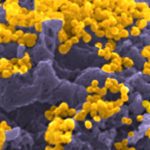Link to Pubmed [PMID] – 18563177
J. Invest. Dermatol. 2008 Dec;128(12):2859-69
Pemphigus are B-cell-mediated autoimmune diseases affecting skin and mucous membranes. They are characterized by the production of pathogenic autoantibodies directed against desmogleins (Dsg). In this prospective study, we treated 21 pemphigus patients with rituximab and analyzed immunological modifications induced by anti-CD20 immunotherapy. The total depletion of peripheral B cells led to a significant decrease of total serum IgM but not IgG levels. The B-cell depletion was followed by a progressive re-emergence of naive blood B lymphocytes, with one-third of them expressing a transitional CD19+CD38(high)CD24(high) phenotype. In most patients, clinical response to rituximab was closely related to the evolution of anti-Dsg autoantibodies that decreased in patients who achieved complete remission, whereas they remained unchanged or reincreased in relapsing patients. In contrast, serum antimicrobial IgG remained stable after rituximab treatment. B-cell repertoire analysis of three patients using immunoscope showed distortions of VH-IgM and VH-IgG immunoscope profiles before treatment, particularly clonal and oligoclonal expansions in some VH families, which were not found after B-cell reconstitution, following anti-CD20 immunotherapy. The depletion of autoreactive B cells leading to the elimination of anti-Dsg autoantibodies in most remitted patients and the restoration of a diverse B-cell repertoire by naive B lymphocytes may provide an explanation for the long-lasting efficacy of rituximab in pemphigus patients.

